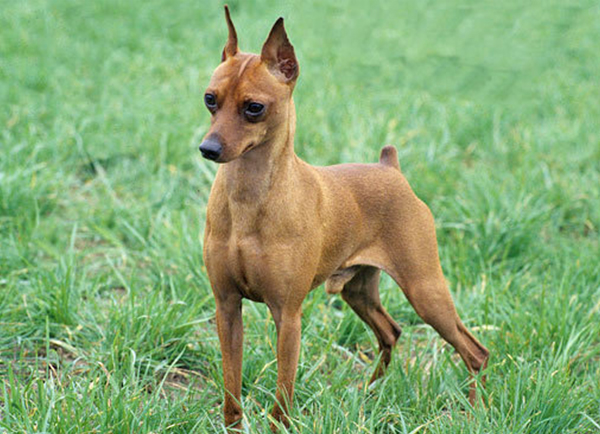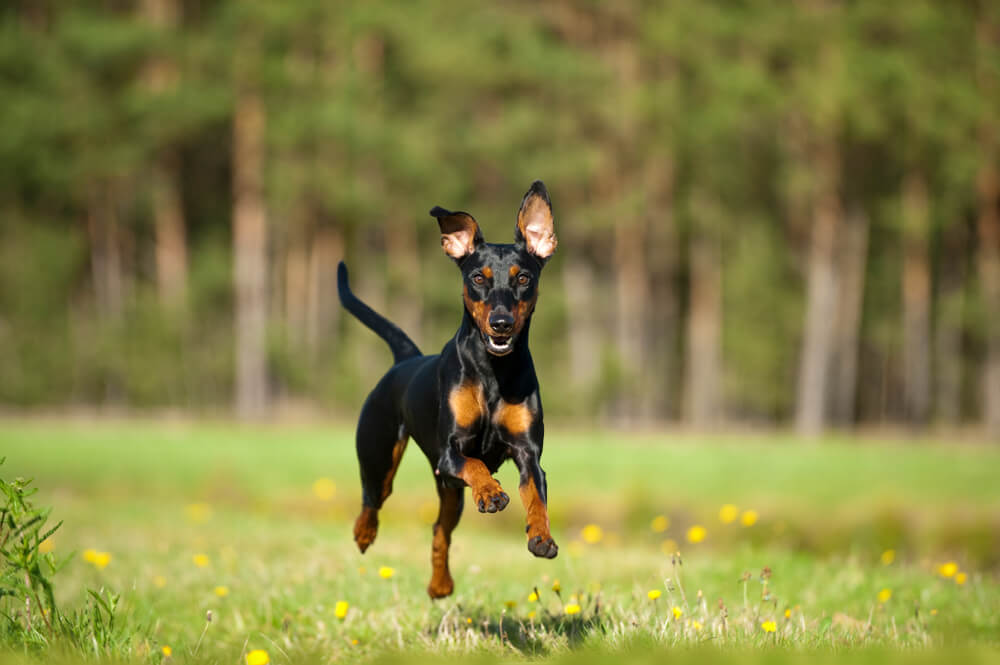The Pinscher Terrier: A Review Of This Energetic, Intelligent Breed
The Pinscher Terrier: A Review of This Energetic, Intelligent Breed
The Pinscher Terrier: A Review of This Energetic, Intelligent Breed

The Pinscher Terrier, a breed that encompasses both the Miniature Pinscher and the Doberman Pinscher, presents a fascinating paradox. They are undeniably charming, with their sleek, athletic builds and intelligent eyes. But their energetic nature and demanding personalities require a dedicated and experienced owner. This review delves into the intricacies of owning a Pinscher Terrier, examining their history, temperament, physical characteristics, health concerns, and suitability for various lifestyles.
A Brief History:
The Pinscher Terrier family traces its roots back to Germany, where they were initially bred for vermin control and guarding. The Miniature Pinscher, also known as the "Zwergpinscher," was developed as a smaller version of the larger Pinscher, likely from a mix of German Pinschers and Dachshunds. The Doberman Pinscher, on the other hand, emerged in the late 19th century, bred by a German tax collector named Louis Dobermann, who sought a loyal and protective companion.
Temperament and Personality:
The Pinscher Terrier, regardless of size, is known for its intelligence, alertness, and unwavering loyalty. They are highly trainable, eager to please their owners, and possess a strong work ethic. However, their independent streak and strong personalities require a firm, consistent hand in training.
Miniature Pinscher:
The Miniature Pinscher, despite its diminutive size, possesses an air of confidence and a bold spirit. They are playful, energetic, and often described as "velcro dogs," always wanting to be close to their owners. Their natural curiosity and alertness make them excellent watchdogs, although their small size limits their ability to deter larger threats.
Doberman Pinscher:
The Doberman Pinscher, on the other hand, embodies a more imposing presence. Known for their athleticism, intelligence, and unwavering loyalty, they are often seen as the "gentle giants" of the dog world. Their protective nature makes them excellent guard dogs, but they require early socialization and training to prevent aggression towards strangers.
Physical Characteristics:

Miniature Pinscher:
- The Cocker Labrador: A Review Of This Unique Canine Hybrid
- The Bouvier Des Flandres: A Review Of This Majestic Breed
- A Tail Wagging Good Time: Reviewing The Kooikerhondje Kennel Experience
- The Italian Spinone: A Review Of This Versatile And Affectionate Breed
- The Cane Corso: A Breed Of Power, Loyalty, And Unwavering Devotion
- Size: 10-12.5 inches tall at the shoulder, weighing 10-12 pounds.
- Coat: Short, smooth, and dense, coming in various colors, including black and tan, red, chocolate, and fawn.
- Head: Wedge-shaped, with a strong jaw and erect ears.
- Tail: Traditionally docked, but increasingly left natural.

Doberman Pinscher:
- Size: 26-28 inches tall at the shoulder, weighing 65-85 pounds.
- Coat: Short, smooth, and dense, coming in black, red, blue, fawn, and white.
- Head: Long and narrow, with a prominent stop and strong jaw.
- Tail: Traditionally docked, but increasingly left natural.
Grooming:
Both Miniature Pinschers and Doberman Pinschers have short, easy-to-groom coats. Weekly brushing is sufficient to remove loose hair and maintain a healthy shine. Baths are necessary only when needed.
Exercise and Activity:
The Pinscher Terrier breeds are highly energetic and require a significant amount of exercise. Daily walks, playtime, and interactive games are essential to prevent boredom and destructive behavior.
- The Cocker Labrador: A Review Of This Unique Canine Hybrid
- The Bouvier Des Flandres: A Review Of This Majestic Breed
- A Tail Wagging Good Time: Reviewing The Kooikerhondje Kennel Experience
- The Italian Spinone: A Review Of This Versatile And Affectionate Breed
- The Cane Corso: A Breed Of Power, Loyalty, And Unwavering Devotion
Miniature Pinscher:
- Exercise Needs: 30-60 minutes of daily exercise, including walks, playtime, and mental stimulation.
- Suitable Activities: Agility training, frisbee, fetch, and interactive toys.
Doberman Pinscher:
- Exercise Needs: 60-90 minutes of daily exercise, including walks, runs, and training sessions.
- Suitable Activities: Agility training, obedience classes, hiking, and swimming.
Training:
The Pinscher Terrier breeds are intelligent and eager to please, making them highly trainable. However, their independent streak and strong personalities require a firm, consistent approach to training. Early socialization and obedience classes are crucial to ensure a well-behaved and well-adjusted dog.
Health Concerns:
While generally healthy breeds, both Miniature Pinschers and Doberman Pinschers are prone to certain health issues.
Miniature Pinscher:
- Patellar Luxation: A condition where the kneecap dislocates.
- Intervertebral Disc Disease (IVDD): A condition that affects the discs in the spine.
- Hypothyroidism: A condition where the thyroid gland does not produce enough hormones.
Doberman Pinscher:
- Dilated Cardiomyopathy (DCM): A condition that affects the heart muscle.
- Von Willebrand Disease: A bleeding disorder.
- Wobbler Syndrome: A condition that affects the spinal cord.
Suitability for Different Lifestyles:
Miniature Pinscher:
- Suitable for: Individuals and families with an active lifestyle, experienced dog owners, and those with fenced yards.
- Not Suitable for: First-time dog owners, individuals with limited time for exercise and training, and those living in apartments without access to outdoor space.
Doberman Pinscher:
- Suitable for: Individuals and families with an active lifestyle, experienced dog owners, and those with fenced yards.
- Not Suitable for: First-time dog owners, individuals with limited time for exercise and training, and those who are not comfortable with a large, powerful breed.
Living with a Pinscher Terrier:
Owning a Pinscher Terrier is a rewarding experience, but it requires dedication and commitment. Their intelligence, loyalty, and playful personalities make them wonderful companions, but their high energy levels and demanding personalities require a certain level of experience and lifestyle compatibility.
Pros:
- Intelligent and trainable: Their eagerness to please makes them highly trainable.
- Loyal and affectionate: They form strong bonds with their owners and enjoy being around them.
- Energetic and playful: Their high energy levels make them great companions for active individuals.
- Alert and protective: Their natural instincts make them excellent watchdogs.
Cons:
- High energy levels: They require significant exercise and mental stimulation to prevent boredom and destructive behavior.
- Strong personalities: They require firm, consistent training and socialization to ensure a well-behaved dog.
- Prone to certain health issues: Both breeds are susceptible to specific health conditions that require regular veterinary care.
- May bark excessively: Their alertness and protective nature can lead to excessive barking if not properly trained.
Conclusion:
The Pinscher Terrier breeds, while undeniably charming and intelligent, are not for everyone. Their demanding personalities, high energy levels, and potential health concerns require a dedicated and experienced owner. However, for those who can provide the necessary care and attention, these breeds can offer a lifetime of companionship, loyalty, and joy. Before bringing a Pinscher Terrier home, carefully consider your lifestyle, experience level, and commitment to provide a happy and fulfilling life for this remarkable breed.
sure
Thus, we hope this article has provided valuable insights into The Pinscher Terrier: A Review of This Energetic, Intelligent Breed. We appreciate your attention to our article. See you in our next article!

Posting Komentar untuk "The Pinscher Terrier: A Review Of This Energetic, Intelligent Breed"